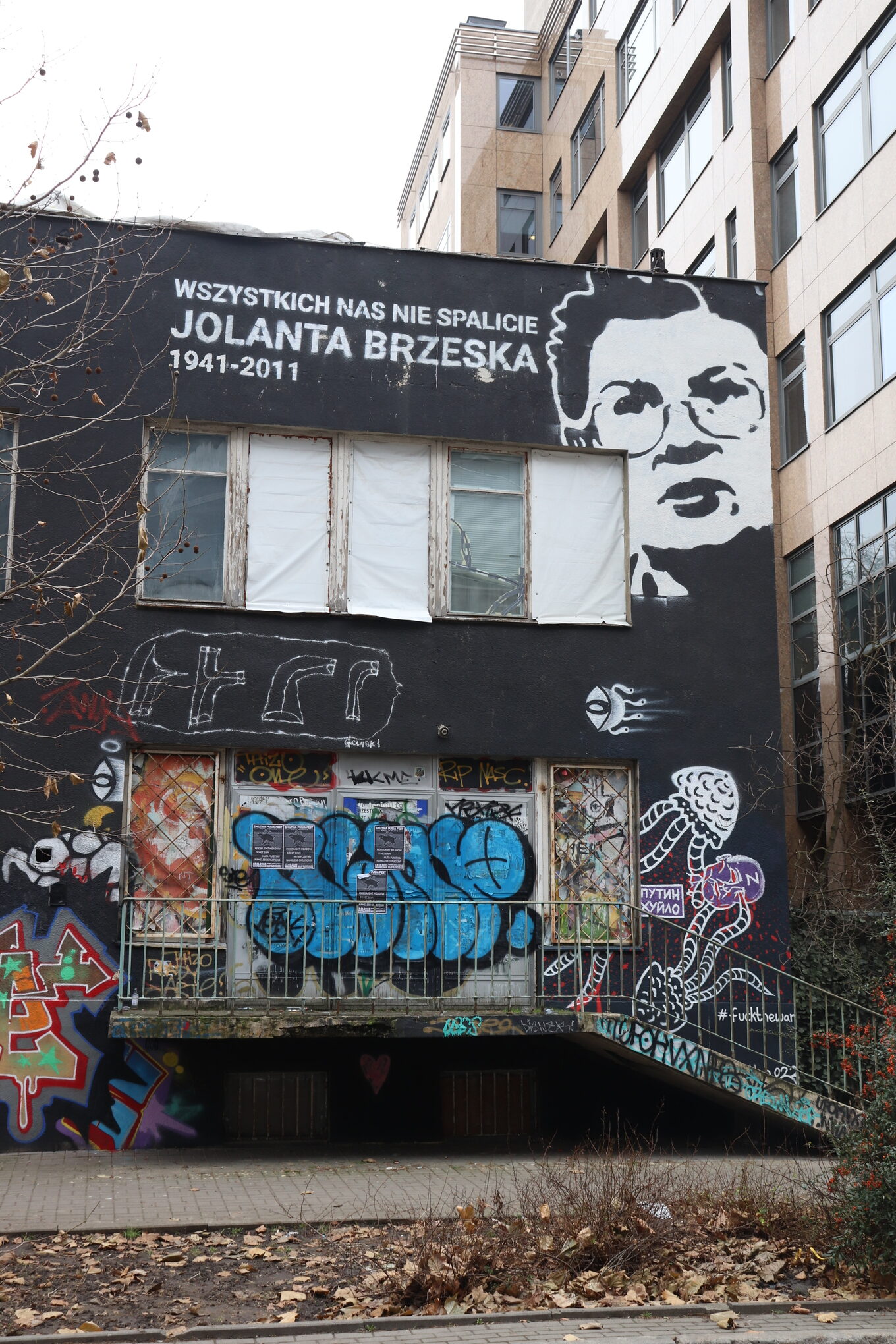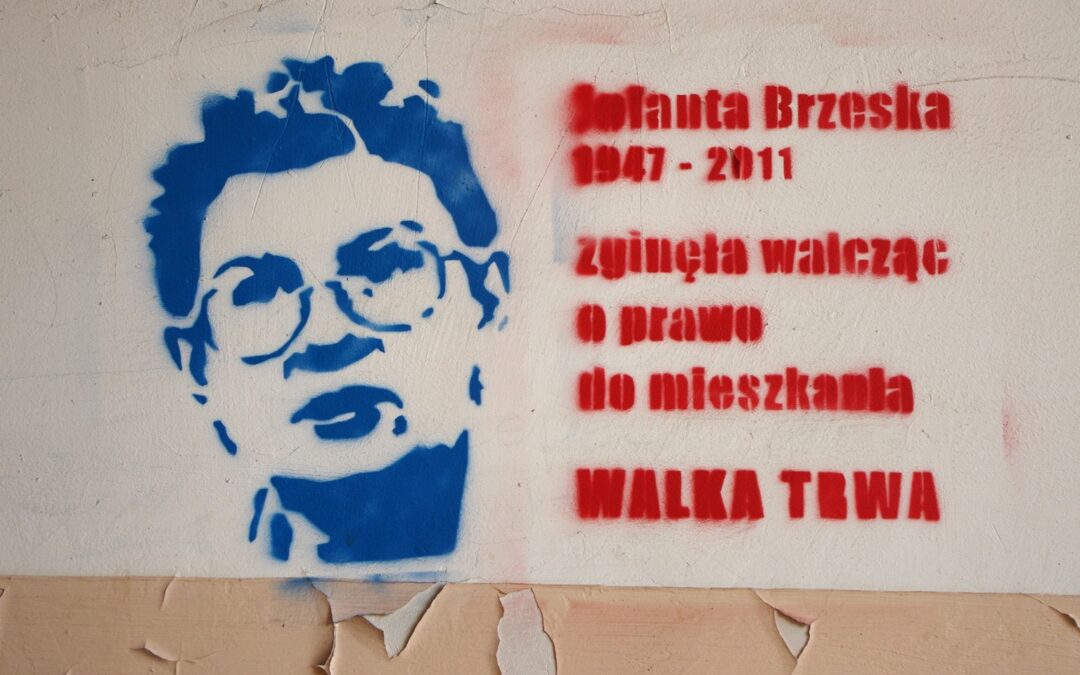Keep our news free from ads and paywalls by making a donation to support our work!

Notes from Poland is run by a small editorial team and is published by an independent, non-profit foundation that is funded through donations from our readers. We cannot do what we do without your support.
Prosecutors have discontinued their investigation into the death of Jolanta Brzeska, an activist who fought for the rights of evicted tenants in Warsaw before her burned body was found in a park in 2011.
Since her death, Brzeska has become a symbol of the fight for tenants’ rights, with her image often appearing on placards and in graffiti. Many believe she was murdered due to her activism, though prosecutors now say there is not enough evidence to determine whether her death was murder, suicide or an accident.
Their decision has been criticised by opposition figures from both the left and right, with some suggesting there has been a cover-up to protect those responsible for Brzeska’s death.
Śledztwo w sprawie śmierci Jolanty Brzeskiej – umorzone.
Szczegóły w komunikacie: ⬇️https://t.co/agtlXgJQNM
— Prokuratura Regionalna w Gdańsku (@Prok_Regio_GDA) November 4, 2024
On 1 March 2011, the burning body of a woman was found in a park in Warsaw by a passer-by. DNA testing confirmed that it was Brzeska. An autopsy showed that kerosene had been poured on her and that she had been alive when set on fire.
An initial investigation by prosecutors found that it was most likely Brzeska had been murdered. However, it was discontinued in 2013 due to a failure to identify any perpetrators.
In 2016, after a new government led by the national-conservative Law and Justice (PiS) party came to power, prosecutor general Zbigniew Ziobro ordered a new investigation, this time entrusted to prosecutors outside Warsaw. He also announced an investigation into potential deficiencies in the original investigation.

“You won’t burn us all,” says the text alongside an image of Brzeska on a building in Warsaw (image credit: Andrzej Otrębski/Wikimedia Commons, under CC BY-SA 4.0)
However, in 2021, when PiS was still in power, the National Prosecutor’s Office announced that no failings had been found in the original investigation. Finally, on Monday this week, the regional prosecutor’s office in Gdańsk, which had been entrusted with re-investigating Brzeska’s death in 2016, ended proceedings.
“There is a lack of evidence sufficient to justify the suspicion of a crime being committed,” wrote Mariusz Marciniak, spokesman for prosecutors in Gdańsk. Each of the three theories regarding her death – that it was caused by murder, suicide or an accident – can still not be “unequivocally confirmed or ruled out”.
Marciniak noted that, during their investigation, almost 300 people were questioned, some several times, and, in cases of doubt, polygraph (lie detector) tests were used. Prosecutors also analysed telephone calls and documents. They even created a 3D simulation of the scene of Brzeska’s death.
“All this, however, did not make it possible to establish the factual circumstances that would clearly support the recognition of one of the versions of the event,” said the spokesman.
Marciniak noted in particular that “the active involvement of the injured party in the Warsaw Tenants’ Association does not provide grounds to assume that Jolanta Brzeska was murdered for this reason, for example as a result of a conflict with persons involved in the reprivatisation of premises in Warsaw”.
Brzeska was known in particular for fighting against what is known as “wild reprivatisation” in Warsaw – a practice by which, after the fall of communism, properties were returned to private hands.
That process in many cases involved fraud and corruption and often resulted in tenants being evicted from the properties in question, sometimes after living there for decades. Brzeska herself had been evicted in such circumstances, prompting her crusade for tenants’ rights.
Poland's new restitution law has been criticised for blocking claims by Holocaust survivors. Israel calls it "antisemitic".
But proponents say it does not discriminate and helps end legal uncertainty
We asked a lawyer to explain what it means in practice https://t.co/DAun2nizt2
— Notes from Poland 🇵🇱 (@notesfrompoland) August 30, 2021
In his statement, Marciniak noted that that, if new evidence emerges, the case can be reopened. However, Brzeska’s daughter, Magdalena, told the Niezależna news website that she no longer wants any more investigations.
“After the first dismissal [in 2013]…it was known that some things had been screwed up [in the investigation],” said Magdalena Brzeska. “At one point, there was an investigation into negligence…[but it] was also swept under the carpet.”
“I don’t intend to take any steps. Why? Thirteen years has passed. What good will it do me? I want to lock the matter away. I don’t want to get worked up all the time. We don’t want them to find the guilty. We don’t want justice anymore. There was time for that. We want there to be silence and everyone to leave us alone.”
Po decyzji prokuratury gorzkie słowa córki Jolanty Brzeskiej: Nie chcemy już sprawiedliwości, był na to czas. Moja rozmowa: https://t.co/UjJpBeA6Sd
— Tomasz Grodecki (@TomaszGrodecki) November 4, 2024
The prosecutors’ decision to end the investigation was also criticised by opposition figures from both the left and right.
“Someone killed Jolanta Brzeska. Someone associated with very influential people. So influential that prosecutor [general Adam] Bodnar drops the case,” wrote Paweł Jabłoński, an MP from PiS, which left office last year. “Shame on all those who have been trying to cover this up for years – and especially on those doing it today.”
Adrian Zandberg, leader of the left-wing Together (Razem) party, wrote, in a tweet that tagged Bodnar, that he “cannot believe I’m reading this. It is simply incomprehensible. Jolanta Brzeska was doused with a flammable substance and SET ON FIRE!”
W przypadku Brzeskiej stało po stronie mafii, po stronie morderców. To było morderstwo polityczne, a fakt, że sprawa została ukręcona pokazuje, że korupcja i demoralizacja sięgają najwyższych szczebli władzy.https://t.co/obTHLzPRGz
— Jan Śpiewak (@JanSpiewak) November 4, 2024

Notes from Poland is run by a small editorial team and published by an independent, non-profit foundation that is funded through donations from our readers. We cannot do what we do without your support.
Main image credit: Mateusz Opasiński/Wikimedia Commons (under CC BY-SA 3.0)

Daniel Tilles is editor-in-chief of Notes from Poland. He has written on Polish affairs for a wide range of publications, including Foreign Policy, POLITICO Europe, EUobserver and Dziennik Gazeta Prawna.



















